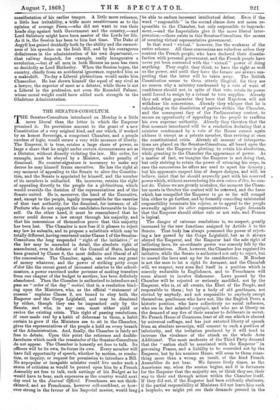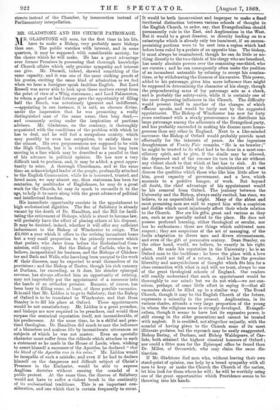THE SENATUS-CONSULTUM.
THE Senatus-Consultum introduced on Monday is a little more liberal than the letter in which the Emperor promised it. Its provisions amount to the grant of a new Constitution of a very original kind, and one which, if worked by an honest Sovereign, a competent Chamber, and a people careless of logic, would secure a very wide measure of liberty. The Emperor, it is true, retains a large share of power, so large a share that he might under certain circumstances act as a Dictator, without directly violating the law. His order, for example, must be obeyed by a Minister, under penalty of dismissal. No counter-signature is necessary to make any decree he may himself frame executive. He has the right at any moment of appealing to the Senate to alter the Constitu- tion, and the Senate is appointed by himself, and the number of its members is unlimited. He, moreover, retains the right of appealing directly to the people for a plebiscitum, which would override the decision of the representatives and of the Senate united. He is, moreover, the head of the Executive, and, except to the people, legally irresponsible for the exercise of that vast authority, for the dismissal, for instance, of all Prefects who do not support the candidates favourable to him- self. On the other hand, it must be remembered that he never could decree a law except through his majority, and that his concessions of themselves prove that this majority has been lost. The Chamber is now free if it pleases to reject any law he submits, and to propose a substitute which may be totally different, having recovered under Clause 1 of the Sonatas- Consult= the long suspended "right of the initiative ;" or the law may be amended in detail, the absolute right of amendment, even in defiance of the Council of State, having been granted by Clause 8, the most definite and liberal of all the concessions. The Chamber, again, can refuse any grant of money whatever, and the power of striking petty coups
etat like the recent grant of increased salaries to the school- masters, a power exercised under pretence of making transfers from one chapter of the budget to another, has been definitely abandoned. Then the Chamber is authorized to introduce and pass an "order of the day' motive, that is, a resolution bind- Mg upon the Ministers, who, as the official "statement of seasons" explains Clause 2, are bound to obey both the Emperor and the Corps Legislatif, and may be dismissed by either, though they can be impeached only by the Senate, and who, in any case, must either yield or revive the existing crisis. This right of passing resolutions, if once made real by a habit of deferenue to them, a habit certain to grow if the Ministers are to sit in the Chamber, gives the representatives of the people a hold on every branch of the Administration. And, finally, the Chamber is fairly set free to debate. Upon this point the reticence and double- facedness which mark the remainder of the Senatus-Consulturn do not appear. The Chamber is honestly set free to talk. Its officers will be its own, its forms its own. Every member will have full opportunity of speech, whether by motion, or resolu- tion, or inquiry, or request for permission to introduce a Bill. No unpopular or incapable minister could live under such a storm of criticism as would be poured upon him by a French Assembly set free to talk, such cuttings of his Budget as he would have to bear, such exposures as the country would next day read in the Journal Ofitiel. Frenchmen are not thick- skinned, and no Frenchman, however self-confident, or how- ever strong in the favour of his Imperial master, would long be able to endure incessant intellectual defeat. Even if the word " responsible " in the second clause does not mean re- sponsible to the Chamber, but only responsible to impeach- ment,—and the Imperialists give it the more liberal inter- pretation,----there exists in this Senatus-Consultum the means of securing virtual representative government. In that word "virtual," however, lies the weakness of the entire scheme. All these concessions are valueless unless they content the French people, who have declared their dissatis- faction with personal government, and the French people have never yet been contented with the " virtual " power of doing anything. They ought, they think, to have the right as well as the power, and until they have the former are always sus- pecting that the latter will be taken away. The British Constitution seems to them utterly illogical, for they see no reason why a ministry condemned by a vote of want of confidence should not, in spite of that vote, retain its power until forced to resign by a refusal to vote supplies. Already they ask what guarantee they have that Napoleon will not withdraw his concessions. Already they whisper that he is calculating on the dissolution of parties within the Chamber, and the consequent fury of the Parliamentary contest, to secure an opportunity of appealing to the people to reaffirm his own supreme authority. Already they threaten that the first measure introduced will be a resolution declaring that a minister condemned by a vote of the House cannot again address it except as a private member, thus reviving at once the constitutional crisis. Already all manner of interpreta- tions are placed on the Senatus-Consultum, all based upon the theory that the Emperor is plotting to retain his absolutism, while granting to the Chamber the appearance of power. As a matter of fact, we imagine the Emperor is not doing that, but only striving to retain the power of retracing his steps, in case the concessions he offers are used to upset his dynasty ; but his opponents suspect him of deeper designs, and will, we believe, insist that he should avowedly part with his reserved . power which, without surrendering his own raison d'être, he can- not do. Unless we are greatly mistaken, the moment the Cham- ber meets in October the contest will be renewed, and the force which has compelled the Emperor to go so far will compel him either to go further, and by formally conceding ministerial responsibility terminate his re'gime, or to appeal to the people avowedly against its other representatives. Logic demands that the Emperor should either rule or not rule, and France is logical.
The danger of extreme resolutions is, we suspect, greatly increased by the new functions assigned by Article 5 to the Senate. That body has always possessed the power of reject- ing a law passed by the Corps Legislatif, but as it always obeyed the Emperor, and the Emperor had the sole right of initiating laws, its co-ordinate power was scarcely felt by the Representatives. Now, however, the Chamber has regained its initiative, while the Senate is authorized not only to reject, but to amend the laws sent up for its consideration. M. Rouher is not the man to let a right lie dormant, and the Chamber will, we suspect, very soon find itself in a position which is scarcely endurable to Englishmen, and to Frenchmen will seem almost to involve dishonour. Laws passed. by the Chamber will be rejected or seriously modified, not by the Emperor, who is, at all events, the Elect of the People, and responsible to them ; but by a body of old gentlemen, not elected by anybody, and not responsible to anybody except themselves, gentlemen who have not, like the English Peers, a historic position, who have collectively no social influence, who are in fact salaried employe's, and who are at liberty on the demand of any five of their number to deliberate in secret. No French House of Commons, least of all one which is elected by universal suffrage, and has just extorted liberty of speech from an absolute sovereign, will consent to such a position of inferiority, and the irritation produced by it will tend to increase the virulence of the attack on the whole Acta Additionel. The most moderate of the Third Party demand that the "nation shall be associated with the Emperor" in governing France, and a liability to be overruled not by the Emperor, but by his nominee House, will seem to them some- thing more than a wrong, an insult, of the kind French Assemblies do not bear. We foresee lively times, as the Americans say, when the session begins, and it is fortunate for the Emperor that the majority see, or think they see, their way to their end through action within the Chamber itself. If they did not, if the Emperor had been evidently obstinate, if the partial responsibility of Ministers did not leave him such a loophole, we might yet see their demands pressed in the streets instead of the Chamber, by insurrection instead of Parliamentary interpellation.































 Previous page
Previous page